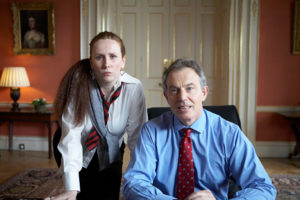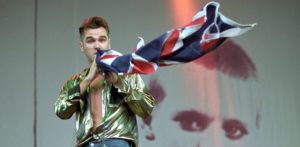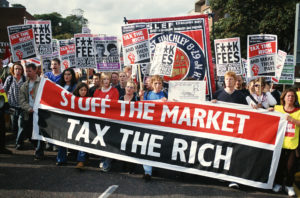Back in the Fifties, when he was still an Angry Young Man, novelist Kingsley Amis declared that he would always vote Labour. Come May 1979, however, and he was one of those feeling jubilant at the election victory of Margaret Thatcher’s Conservative Party. “Bloody good, eh?” he wrote to his friend, the poet Philip Larkin. Meanwhile, Peter Hall, the director of the National Theatre, who’d always thought of himself as being on the Left, had been so driven to distraction by a succession of strikes that he too cast his vote for the Tories. “It wasn’t at all difficult,” he noted in his diary. “In fact it positively felt good.”
These were the exceptions rather than the rule in the cultural establishment. For the most part, there was an early dislike of Thatcher that rapidly hardened into hatred. She was, said TV dramatist Dennis Potter, “the most obviously repellent manifestation of the most obviously arrogant, divisive and dangerous British government since the war”. Or, in the words of Jonathan Miller, she “was loathsome, repulsive in almost every way, with her odious suburban gentility and sentimental, saccharine patriotism”.
No previous prime minister had attracted these levels of opprobrium, but more striking still was that she exerted such a strong cultural fascination even before reaching Downing Street. There were jokes about her in sitcoms such as George and Mildred and Fawlty Towers when she was leader of the opposition, and she warranted a mention in Linton Kwesi Johnson’s 1978 poem “It Dread Inna Inglan”: “Maggie Thatcher — on she goes with a racist show, but she has to go.” She went on to set a modern record both for the length of her premiership and for the number of negative appearances she made in comedy and music.
Part of the dislike came from the fact that Thatcher herself appeared so little interested in the world of culture. She was, said Malcolm Williamson, Master of the Queen’s Music, a “stupid mindless Philistine”. Even the former Labour MP Woodrow Wyatt, a friend and devotee, who liked to think of himself as an eminently civilised man, concluded sadly: “She has no taste.”
That wasn’t quite right. As a teenager, she’d been a regular cinema-goer, dreaming of dancing like Ginger Rogers and enthusiastically reviewing the movies she’d seen in letters to her older sister. (“I can’t say I liked it,” she noted of the 1941 adaptation of Love on the Dole.) But her taste never seemed to develop much further.
As an adult, she had better things to do, and the arts were strictly peripheral in her life. She was a guest on Desert Island Discs in 1978, and opted for obvious pieces by Beethoven, Dvorak and Verdi. A decade later, when she was asked about her favourite books, she said she was currently re-reading Frederick Forsyth’s thriller The Fourth Protocol, a novel in which she herself featured (favourably, in this instance). The impression was that she didn’t know much, and cared slightly less. She was more clear about what she didn’t like; she dismissed Francis Bacon as “that artist who paints those horrible pictures”, which may have been the truth but wasn’t the whole truth.
It was all so appallingly middle-brow and — to use that insult of Miller’s — suburban: the most damning of all adjectives in British cultural circles. To make things worse, she disapproved of state funds being used to prop up uneconomic businesses and made no exception for the arts. After all, Andrew Lloyd-Webber was a man of the theatre and he managed to stand on his own two feet without relying on government hand-outs. “Why can’t you be more like Andrew?” she demanded of Hall, who was beginning to regret his 1979 vote. As Jim Hacker said in her favourite TV show, Yes, Minister: “Why should the rest of the country subsidise the pleasures of the middle-class few?” For her enemies, this wasn’t a culture war so much as a war on culture.
As was sometimes the case with Thatcher, however, the rhetoric was not matched by reality. During her time in office, spending by the Arts Council in England and Wales increased by over 20% in real terms. (It fell slightly in Scotland.) There were major new initiatives, as well. One of the biggest projects of recent decades — the building of the British Library — was undertaken on her watch, and there was also the introduction, after decades of lobbying, of the Public Lending Rights scheme, which rewarded writers when their books were borrowed from public libraries.
And then there was Channel 4, launched in 1982 and charged with catering for minority tastes and interests. Jeremy Isaacs, the chief executive of the new channel, understood this as meaning “minorities” in a Ken Livingstone kind of way. “Should black Britons, should the young, should feminists, should homosexuals see themselves, canvass their ideas, on television?” he said. “I see no reason why not. They are of this society, not outside it.” That wasn’t what the government meant. “You’ve got it all wrong,” the Employment Secretary Norman Tebbit told Isaacs. “Golf and sailing and fishing. Hobbies. That’s what we intended.”
It was too late, and the new channel became in its early years a beacon of anti-Thatcherism, giving a platform — among others — to alternative comedians, who suited both the tone of the channel and its tight budgets. Altogether, noted The Times, Channel 4 was “just the sort of thing to inflame that school of opinion, so strong in the upper echelons of the Conservative Party, which believes that the Left is in control of the nation’s television”.
The same law of unintended consequence also operated in Tebbit’s most substantial contribution to the arts. As the dole queues lengthened to three million and more, he launched the Enterprise Allowance Scheme under the slogan: “Inside every unemployed person, there’s a self-employed one.” If you’d been unemployed for at least 13 weeks and could find £1,000 of capital (possibly in the form of a bank loan), then the government would pay you £40 a week for a year to get a business started. The income was tax-free and was substantially higher than the current rate of unemployment benefit.
The intended recipients were the self-employed; plumbers and window-cleaners were the oft-cited examples, and it was reported that an early trial had helped “such diverse activities as a kissogram service, a hang-gliding school, a private detective agency and a lampshade manufacturer”. But there were also applications from people working in the creative industries. In 1984 a group from Solihull, Eye Do It, became the first pop band to release a single under the scheme, with “I Lost My Mind”. That didn’t make much impact, but others were more successful, including artists Tracey Emin and Rachel Whiteread and comedians Alan Davies, Harry Enfield and Sean Lock.
Inadvertently, Tebbit had turned into one of the great patrons of culture in modern Britain. Again, though, there was little gratitude on display. “We weren’t children of Thatcher; we hated her,” insisted McGee. Viz comic, on the other hand, which was another beneficiary of the Enterprise Allowance Scheme, always seemed to have an ironic affection for her; as late as 2009 it pictured her on a “True Blue” cover of Playboy magazine with the headline: “Maggie! Maggie! Maggie! Tits Out! Out! Out!”
The cultural antipathy to Thatcher continued throughout her premiership, but it changed as it went on. The evolving mood was captured most concisely in pop music. Her first term saw the high point of Rock Against Racism and of protest songs. Mass unemployment produced the riposte of UB40’s “One in Ten” (1981) and the Specials’ “Do Nothing” (1980). The B-side of the latter was a cover of Bob Dylan’s “Maggie’s Farm”, which had gained a new relevance: “I ain’t gonna work on Maggie’s Farm no more.” The Beat went with the more direct “Stand Down, Margaret” (1980).
She didn’t heed that advice, and after her re-election in 1983, the tone became more fearful, with a spate of anti-nuclear hit singles by Iron Maiden, Culture Club, Sting and Genesis. The real trend, though, was away from politics and towards charity. The Live Aid concert in 1985 featured Paul Weller’s band the Style Council performing politically engaged songs “Walls Come Tumbling Down” and “Internationalists”, but the central impulse was one that chimed perfectly with Thatcher’s espousal of Victorian values of faith, self-help and charity. Elsewhere, the most memorable song directly addressing Thatcher in 1985 was the Exploited’s punk anthem “Maggie”, not so much a protest as a howl of impotent rage: “Maggie, Maggie, Maggie, you fucking cunt!”
And then, as the years wore on and on, a sense of fatalism descended. Thatcher looked immovable and the fantasies started of her death: the Blow Monkeys’ “(Celebrate) The Day After You” (1987), Elvis Costello’s “Tramp the Dirt Down” (1989), Morrissey’s “Margaret on the Guillotine” (1988). There was still a visceral hatred, but no hope, just a weariness. A decade after she left office, the same theme was to be found in “Merry Christmas, Maggie Thatcher” in Billy Elliott: The Musical (2000), cheerfully celebrating that we were “one day closer to your death”. On 8 April 2013, the day she actually died, the audience at the show was asked if it should be excluded from the night’s performance; overwhelmingly, they opted for it to be left in.
And still, the cultural fascination continues. In the forthcoming movie Reagan, Lesley-Anne Downe will become the latest in a long line of actresses to give us their Margaret, which can be traced all the way back to Janet Brown in the James Bond movie, For Your Eyes Only (1981). Best known was Meryl Streep’s incarnation in The Iron Lady (2011), which in turn inspired the pornographic satire The Iron Lady Garden (2012), with Rebecca More as Aggie Snatcher.
It’s been a long, strange affair, this relationship of Thatcher with the arts. She knew it sort of mattered, which is why, in her first conference speech as Tory leader in 1975, she denounced “those who gnaw away at our national self-respect, rewriting British history as centuries of unrelieved gloom, oppression and failure”. (The context made it clear that she was talking specifically about the BBC.) But it wasn’t really important enough, and there were so many other dragons to be slain.
So while she was busily rewriting the political norms on public ownership, trade unions and the economy, she was losing all the cultural arguments. And since cultural artefacts have a longer shelf-life than do inflation rates, they have increasingly shaped the memory of Thatcher. The further we get away from her, the more public attitudes are shaped by hostile depictions of her and her policies. She still looms large, even for those born after her defenestration in 1990, but she’s seen more and more negatively.
It is worth remembering, though, that when it really mattered, Thatcher’s instincts were absolutely sound. For most of the Eighties, Salman Rushdie was one of the loudest voices of condemnation. Hers were “the politics of the Victorian nursery”, he mocked, and in The Satanic Verses (1988) he referred to her as “Maggie the Bitch”. That was the book that saw Iran offer a $6 million bounty to anyone who would kill Rushdie. In the ensuing tumult, Thatcher saw only a simple principle. “It is a fundamental matter of freedom of speech,” she said. Whatever else she thought about the role of the state, she was sure that one of its duties was the protection of its citizens from foreign governments, and for the best part of a decade — until he withdrew it — Rushdie was given full-time police protection.
He and she only ever met once, at Scotland Yard. Given their very different characters, it seemed unlikely that they could ever find a personal rapport, but somehow a connection was made. “She was very touchy-feely,” remembered Rushdie. “She was, like, pawing at me, and I thought, ‘I’m being groped by the Prime Minister!’”
Disclaimer
Some of the posts we share are controversial and we do not necessarily agree with them in the whole extend. Sometimes we agree with the content or part of it but we do not agree with the narration or language. Nevertheless we find them somehow interesting, valuable and/or informative or we share them, because we strongly believe in freedom of speech, free press and journalism. We strongly encourage you to have a critical approach to all the content, do your own research and analysis to build your own opinion.
We would be glad to have your feedback.
Source: UnHerd Read the original article here: https://unherd.com/







